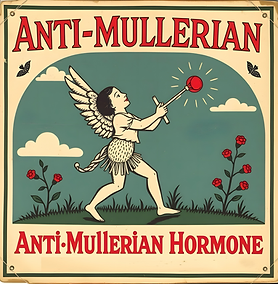Welcome to the CPTwomen, Tubal.org, your source for information about the side effects of female sterilization, salpingectomy, tubal ligation, Essure, and clips.
This site includes affiliate links to products & services. When you buy something we *suggest or mention we may earn a small commission at no extra cost to you. We thank you.
advertisement
Why “Post Sterilized Women” should get their anti-Müllerian Hormone (AMH) levels checked


Anti Müllerian Hormone (AMH) is useful in evaluating ovarian function because levels decline as ovarian function declines. AMH levels are low to undetectable in female infancy and after menopause. Low levels of AMH in a woman of reproductive age (under the age of 40) indicate ovarian hypofunction or “early menopause”. AMH levels do not vary greatly throughout the menstrual cycle so they can be measured on any day of the cycle. AMH is not altered or influenced by birth control pills or pregnancy. A decrease in AMH can be caused by increasing age, obesity, chemotherapy/radiation, hysterectomy and by “tubal sterilization”.
2011 Tubal Sterilization study demonstrates an association between tubal sterilization and reduced ovarian reserve...
2011 Hysterectomy study demonstrated that total abdominal hysterectomy causes 30% more loss of ovarian reserve in addition to the effects of aging…
Women under the age of 46 who had both ovaries removed (or lose function of both ovaries) experienced a marked increase in eight chronic health conditions, including coronary artery disease, depression, memory (dementia), arthritis, chronic obstructive pulmonary disease and osteoporosis. Read more...
Just because ovaries are present after tubal ligation, female sterilizations, salpingectomy, and in the case of hysterectomy with ovarian conservation/preservation does NOT mean they will continue to function as before.
After these surgeries it is important that women regularly monitor their hormone levels. If it is found that ovarian function is decreased or lost there are treatments which can help a woman’s overall short term and long term health. ~ Susan Bucher, BSN, RN